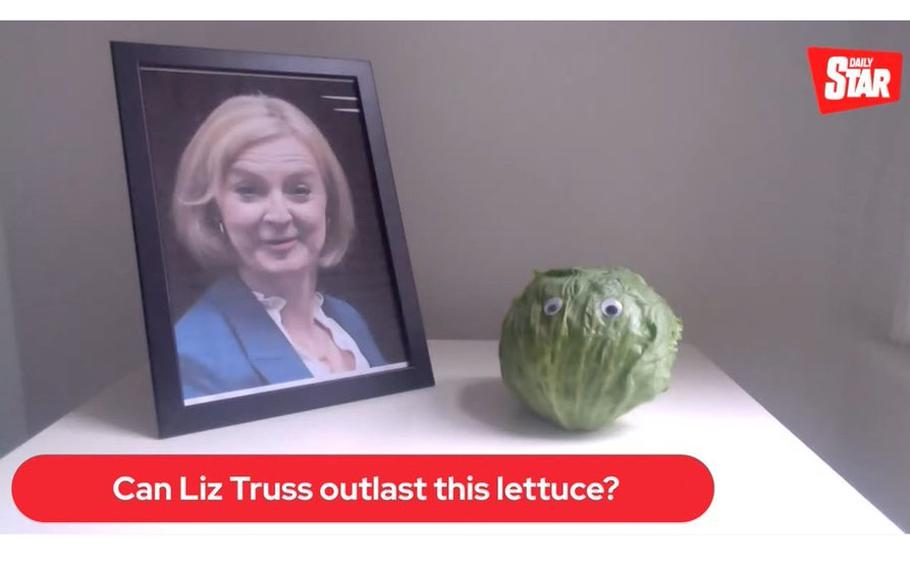
As the woes of Liz Truss multiplied, with astonishing speed, the tabloid newspaper Daily Star pointed a webcam at a head of lettuce and asked readers to monitor whether the lettuce would last longer than the prime minister. The lettuce won. (Facebook)
Rishi Sunak has been elected leader of the Conservative Party and become the next prime minister of the United Kingdom (Britain plus Northern Ireland). This follows the incredibly brief and tumultuous tenure of hapless Prime Minister Liz Truss.
Sunak is a promising choice, and the process by which he was selected reassuring. Conservative Members of Parliament nominate candidates to be leader, and party members around the country vote if there is more than one nominee.
Others withdrew in deference to Sunak, who has senior executive experience in government and finance. This effectively underscores the gravity of the current situation.
The British possess distinctive humor, cutting and subtle. As the woes of Truss multiplied, with astonishing speed, the tabloid newspaper Daily Star pointed a webcam at a head of lettuce and asked readers to monitor whether the lettuce would last longer than the prime minister.
The lettuce won.
After Truss resigned after only 45 days in office, the head of lettuce received a gold plastic crown to go along with a blond wig. As her resignation became official, the webcam indicated 20,000 were looking at the lettuce on YouTube.
The Economist inspired the lettuce gimmick by asking rhetorically whether the next prime minister could last longer than a head of lettuce. This effectively implies current governmental instability.
Britain has had three prime ministers in just over three years: Theresa May, Boris Johnson and Liz Truss. There now have been three prime ministers in less than three months.
Brexit, shorthand for leaving the European Union, was finally carried out by Johnson’s government. The vexing details of disengaging from the EU bureaucracy were responsibly addressed by May, but Parliament rejected her complex plans.
Characteristically, Johnson largely ignored the difficulties and rammed Brexit through. This has created special problems regarding Northern Ireland. The province is in Ireland but under British sovereignty. To a significant degree, Britain’s current political disorder is a direct function of not addressing resulting economic and policy problems.
Truss brought forward a radical supply-side budget, including dramatic tax cuts at the top of the income scale. Global financial markets reacted quickly, and severely. So-called “gilts,” short for gilt-edged security, issued by the Treasury and listed on the London Stock Exchange, immediately declined precipitously.
The Bank of England reacted quickly, of necessity, to stabilize the market. Otherwise, the British financial system could conceivably have collapsed.
In reaction, mass media concern has focused on London and other financial markets, in particular the United States. Could the same sort of crisis unfold quickly on the other side of the Atlantic? Since the turn of the century, both Democratic and Republican administrations have presided over enormous fiscal deficits, and Federal Reserve policies that have kept real interest rates very close to zero for many years.
Nevertheless, a comparable U.S. financial crisis seems unlikely, though financial panics are always possible. The vast scale and wealth, and unequaled global influence, of the American economy provide reliable underwriting for public debt that has expanded rapidly.
Britain lacks these obvious assets but does possess more subtle advantages. These include an effective military, skillful diplomats and a history of developing worthwhile alliances, not least with the United States. The Ukraine war shows importance of British strengths.
Nowhere is this better demonstrated than in NATO. That war has remarkably energized and renewed this durable alliance, in existence since 1949. Formerly neutral Finland and Sweden have now joined the alliance, after initial opposition from the government of Turkey was successfully addressed. The British government was crucial in brokering the participation of Canada and the United States from the beginning in this organization.
Rishi Sunak’s lineage is from India, a first among Britain’s prime ministers. That may foster fresh, imaginative approaches to public policy that current circumstances require.
Arthur I. Cyr is author of “Liberal Politics in Britain.”